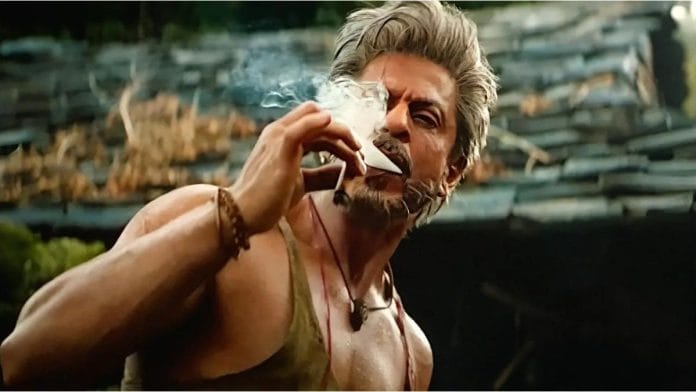Manmohan Singh’s policies did to the Angry Young Man in Bollywood movies what Manmohan Desai’s films could not. Replaced the bidi in his hand with the cigar.
This happened as India’s economy grew exponentially after Singh liberalised it in 1991 and his policies paved the way for the country’s emergence as one of the fastest-growing economies of the world.
Whether it is Shah Rukh Khan in the 2023 Bollywood blockbuster Jawan or Unni Mukundan in the highest-grossing A-rated Malayalam film of all time Marco or Kannada superstar Yash in the upcoming film Toxic, the hero has more reasons to be angry and smoking, but he now earns enough to ditch the bidi. The bidi is out of fashion even though toxic masculinity and gratuitous violence aren’t.
Angry hero and the bidi
If India of the 70s and early 80s was about mass unemployment, large-scale political corruption, and the marginalisation of the common man, Manmohan Desai’s 1983 film Coolie was about the rage against that unjust system. As a coolie at a Mumbai railway station, the film’s hero, a young Muslim man, is at the very bottom of the social pyramid, separated from his family by a flood. Pushed to the wall, Iqbal fights for the rights of coolies and takes on the rich businessman who has kept his family away from him.
Stylised action sequences, memorable dialogues, and an engaging plotline made the audience willingly suspend their disbelief and imagine the real-life son of a famous poet as a luggage carrier at the rail station. What also helped in no small measure was Amitabh Bachchan’s acting chops, the way his character was fleshed out in the film and how he smoked his bidi on screen. For the audience, it was an instant connection with the underclass. Coolie went on to become one of Desai’s most political films and one of the most successful films of that era.
The Angry Young Man of Indian Cinema, though, had been birthed a decade before the Coolie. With his striking height and uniquely deep baritone, Bachchan started his journey with films like Zanjeer (1973), Deewaar (1975) and Ramesh Sippy’s Sholay (1975). In Zanjeer, Bachchan played an angry cop up against an unjust system, in Deewaar, he essayed the role of a shoeshine boy who becomes an underworld don and in Sholay, along with Dharmendra, he played a jailbird on hire to take on a dreaded dacoit.
These films marked the beginning of an era of Indian movies where amorality became the norm in the fight against an immoral system. “It was as if the hero on the screen had unleashed a repressed angst. Here was a man ready to take on the system. It was the beginning of anti-establishment films where the hero was the anti-hero,” film journalist Bhawana Somaaya wrote. And in most of these films, dangling from Bachchan’s lips, was the ubiquitous bidi, a visual signifier of the social class his characters represented.
Also read: Indian films and OTTs see money in Dalit stories. But watch out for symbolic violence
The shift to cigars
Bengali film director Srijit Mukherji told me when he was writing his 2011 thriller, Baishe Srabon, he wanted to make the lead character a hyper-masculine man.
Probir Roychowdhury (played by Bengali superstar Prosenjit Chatterjee) is a tough-as-nails ex-cop who has been expelled from service for excessive use of violence and extrajudicial killings. Roychowdhury is a man who comes from a family of feudal lords, stays in a dilapidated but expansive mansion, drinks whiskey and smokes cigars. “To me, boys smoke some cigarettes, men smoke king-size cigarettes and the larger-than-life film hero smokes the cigar. It signifies hyper-masculinity, an almost phallic symbol,” Mukherji told me.
Vikram’s story in Shah Rukh Khan’s Jawan is not anywhere close to Roychowdhury’s. Vikram is a former special forces operative who has been wronged by a military contractor, thrown off a plane and left to die. But when fate brings him back into the centre of action, he pulls out the guns, gets on a bike and puffs the cigar.
Unni Mukundan as Marco D’Peter in the 2024 Malayalam blockbuster is also looking for revenge. Written and directed by Haneef Adeni, the film’s violence is so intense that several reviews warn those squeamish about blood to skip it. Unlike Jawan, Marco is not a film you can watch with your family on the weekends. But the one common factor is the cigar. Marco D’Peter, like Vikram, simply can’t do without his cigar.
Suchismita Das, assistant professor of sociology at Government General Degree College, Mangalkote, West Bengal, said the bidi was a marker of rugged, proletarian rebellion in Indian films.
“The bidi was emblematic of a grounded party worker in a stagnant, socialist economy. But just like Vijay in Deewar, the humble dock worker who rose up to wear bespoke suits, the Indian economy has transitioned,” she said. The cigar, Das said, is a signifier of power, global aspiration, and individual dominance in an increasingly capitalist cultural milieu.
Mid-Day’s film critic Mayank Shekhar calls it the visual signifier of the anger of the privileged. “There are still enough reasons and more to rage against the system but the film hero can’t deny his own privilege. Hence, the cigar,” he said.
It is not just in the movies—more and more Indians are smoking cigars. A report says the cigar and cigarillos market in India is expected to reach a projected revenue of $ 5,585.1 million by 2030. “A compound annual growth rate of 6.5 per cent is expected of India cigar and cigarillos market from 2024 to 2030,” it said.
While it is a mystery what Yash’s character in Toxic is up against, the film’s teaser confirms the cigar will remain a constant.
(Edited by Ratan Priya)






